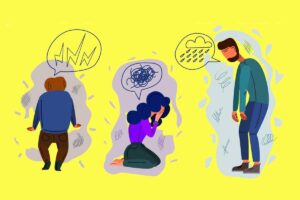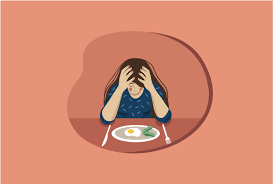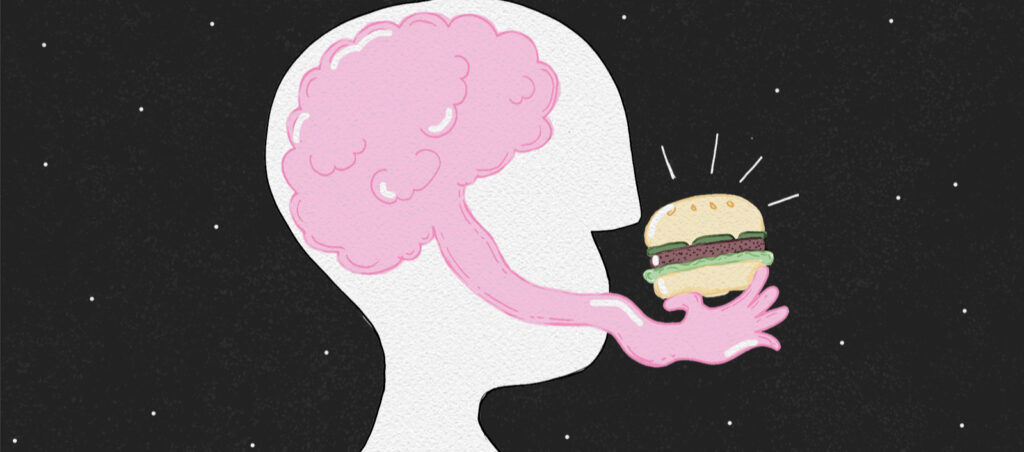Do you often find yourself overeating when you’re feeling stressed out? If so, you’re not alone. Many people turn to food as a way to cope with anxiety and stress. This can lead to weight gain and other health problems. In this blog post, we will discuss how to stop eating when you’re stressed out. We will provide tips and advice that will help you overcome your anxiety eating habits!
Contents
Defining Anxiety Eating
 We are all familiar with the feeling of stress and anxiety. When we experience stress, our bodies release a hormone called cortisol. Cortisol is known as the “stress hormone” because it helps us deal with stressful situations. It does this by increasing our heart rate and blood pressure. This gives us the energy we need to fight or flee from a dangerous situation.
We are all familiar with the feeling of stress and anxiety. When we experience stress, our bodies release a hormone called cortisol. Cortisol is known as the “stress hormone” because it helps us deal with stressful situations. It does this by increasing our heart rate and blood pressure. This gives us the energy we need to fight or flee from a dangerous situation.
In some cases, the stress we experience is not from a physical threat, but from an emotional one. When this happens, our bodies can still release cortisol. This can lead to anxiety eating, which is when we eat even though we’re not physically hungry. We may turn to food as a way to cope with our stress and anxiety. This can become a vicious cycle. It can also have serious consequences on our health.
If you’re struggling with anxiety eating, know that you’re not alone. This is a common problem that people face. But there are ways to overcome it!
Link Between Anxiety And Eating
We understood the physiological link between anxiety and eating. Now, let’s explore the psychological link between these two things.
- For many people, food is a source of comfort. This is especially true for those who grew up in households where meals were times to bond with family members.
- As we get older, we may find ourselves turning to food when we’re feeling stressed or anxious. When we’re feeling stressed, we may crave certain foods that are high in sugar or fat. These foods can give us a temporary boost of energy and make us feel better. However, they can also lead to weight gain and other health problems.
- It is also a typical observation that people tend to eat more when they’re feeling anxious or stressed. This is because our bodies release cortisol, the “stress hormone.” Cortisol can increase our appetite and make us crave high-sugar and high-fat foods.
- When we are anxious, we tend to look for things that will make us feel better in the moment. For some people, this may be comfort food. Eating can be a way to soothe our nerves and ease our anxiety. However, overeating when we’re anxious can lead to weight gain, health problems, and even more anxiety.
- The very last repercussion of anxiety eating is the fact that it can perpetuate a cycle of anxiety and poor body image. If you are constantly overeating because you’re anxious, you may start to feel like your body is not good enough. This can lead to more anxiety and more overeating.
These are some of the ways that anxiety and eating are linked. If you’re struggling with anxiety eating, know that you’re not alone. There are ways to overcome it!
Triggers
 Our emotional health is a very tricky thing. It can be easily triggered by different events happening in our lives. What sets off one person may not do so for another. It is important to be in tune with your emotions and know what sets off your anxiety.
Our emotional health is a very tricky thing. It can be easily triggered by different events happening in our lives. What sets off one person may not do so for another. It is important to be in tune with your emotions and know what sets off your anxiety.
Some common triggers for anxiety eating include:
- Feeling overwhelmed: When we feel like we’re not in control of our lives, it can lead to anxiety. This can be caused by work, school, or personal problems.
- Feeling isolated: If we feel like we’re not connected to others, it can lead to anxiety and loneliness. This can be caused by social media, breakups, or moving to a new place.
- Changes in routine: If something disrupts our usual routine, it can lead to anxiety. This can be caused by a change in work hours, traveling, or having a baby.
- Feeling like you’re not good enough: If we feel like we’re not good enough, it can lead to anxiety. This can be caused by comparison shopping, social media, or negative self-talk.
- Worrying about your weight: If you’re constantly worrying about your weight, it can lead to anxiety and eating disorders. This can be caused by dieting, body image issues, or pressure from others.
- Comparing yourself to others: Comparison arises from a feeling of insecurity. When we compare ourselves to others, it can lead to anxiety and low self-esteem.
- Perfectionism: Lastly, when we strive for perfectionism, it can lead to anxiety. This can be caused by work, school, or personal pressure.
Anxiety eating can be triggered by many different things. It is important to be aware of your triggers so that you can avoid them or be prepared for them.
Consequences
It goes without saying that there are many consequences that come along with anxiety eating. The most obvious one is weight gain. However, these effects go beyond weight. They can even interfere with our psychological well-being.
Physiological
 The foremost consequence is, of course, weight gain. When we overeat, we consume more calories than we burn. This can lead to obesity and all the health problems that come along with it.
The foremost consequence is, of course, weight gain. When we overeat, we consume more calories than we burn. This can lead to obesity and all the health problems that come along with it.
Obesity is a very real and dangerous health problem. It can lead to heart disease, stroke, diabetes, and even cancer.
Another physical consequence of anxiety eating is gastric distress. This is because when we’re anxious, our digestive system slows down. This can lead to indigestion, constipation, diarrhea, and other gastrointestinal problems.
Since anxiety eating makes us binge on foods high in sugar, fats, excess spice and salt, it is also one of the major causes of acidity.
The unhealthy quality and quantities of food also impact our skin, hair, nails and overall physical appearance in a negative way.
Psychological
 The psychological effects of anxiety eating can be just as damaging as the physical ones. When we’re anxious, we tend to eat for emotional reasons rather than hunger. This can lead to feelings of guilt and shame. We may even start to view food as an enemy.
The psychological effects of anxiety eating can be just as damaging as the physical ones. When we’re anxious, we tend to eat for emotional reasons rather than hunger. This can lead to feelings of guilt and shame. We may even start to view food as an enemy.
Anxiety eating can also lead to isolation. We may start to avoid social situations because we’re embarrassed about our weight or how we look. This can lead to further feelings of isolation and loneliness.
The most bizarre and threatening psychological consequence of anxiety eating is eating disorders. The most common ones are anorexia nervosa and bulimia nervosa. These disorders can have a devastating effect on our physical and mental health.
Anxiety eating is a serious problem with many consequences. It is important to be aware of your triggers and learn how to deal with them.
It is important to remember that you are not alone in this. Many people struggle with anxiety eating. However, there are ways to cope with it.
Tips To Deal
Luckily, there are various things you can do to deal with anxiety eating.
The first step is to identify your triggers. Once you know what sets off your anxiety,
Identify triggers
The foremost step to tackle anxiety eating is to identify the triggers. Once you are aware of the things that set off your anxiety, you can either avoid them or be prepared for them. This can happen by:
- Keeping a food journal: This will help you keep track of the times when you overeat. You can also note down your mood and anxiety levels at these times. This will help you identify patterns and triggers.
- Identifying your hunger cues: It is important to be able to differentiate between actual hunger and emotional hunger. Emotional hunger is often accompanied by cravings for specific foods. It is also hard to control. On the other hand, actual hunger is easier to control.
- Avoiding trigger foods: Once you know what foods trigger your anxiety, it is best to avoid them. This can be difficult, but it is important to try.
- Planning ahead: If you know that you will be in a situation where you might be triggered, it is best to plan ahead. This can involve bringing healthy snacks with you or making sure you have a meal before you go.
Practice self-love

When we are caught in a loop of anxiety and overeating, it is important to practice self-love. This can involve:
- Eating mindfully: This means being aware of what you are eating and why. It also means being present at the moment and savoring your food.
- Being gentle with yourself: This means not being critical of yourself. Accepting yourself as you are and treating yourself with kindness and compassion.
- Engaging in physical activity: This can help you release endorphins, which can help improve your mood. It is also a great way to get out of your head and focus on something else.
- Challenging negative thoughts: Instead of thinking “I’m so fat,” try thinking “I’m beautiful.”
Find distractions
When you begin to feel the urge to overeat, it is important to find a distraction. This can help you avoid making unhealthy choices. Some distractions include:
- Calling a friend
- Reading a book
- Listening to music
- Watching a movie
- Going for a walk
- Doing some deep breathing exercises
Plan alternatives
When you feel the urge to overeat, it is not always correct to suppress it. So, have some healthy alternatives ready. This can help you satisfy your cravings without overeating. Some alternatives include:
- Eating fruits or vegetables
- Drinking water or herbal tea
- Chewing gum
- Listening to calm music
- Stretching or doing some light exercises
Set realistic goals
It is very important to set realistic goals when it comes to dealing with anxiety eating. This is because if you set unrealistic goals, you are more likely to become frustrated and give up. So, start small and gradually make changes. Remember, the goal is not to be perfect but to be better than before.
Identify support system
Social support can be very helpful when it comes to dealing with anxiety eating. So, identify the people in your life who can support you in this journey. This can involve family, friends, or even a therapist. They can help you in various ways, such as:
- Helping you stay on track
- Encouraging you when you feel down
- Listening to you
- Providing advice and resources
Get professional help
 Lastly, if you think your anxiety eating is out of control, it is best to seek professional help. This can involve seeing a therapist or a dietitian. They can help you in various ways, such as:
Lastly, if you think your anxiety eating is out of control, it is best to seek professional help. This can involve seeing a therapist or a dietitian. They can help you in various ways, such as:
- Identifying the root cause of your anxiety
- Creating a plan to deal with anxiety and overeating
- Teaching you healthy coping skills
- Providing support and guidance
Anxiety eating can be a difficult problem to deal with. However, there are ways to cope with it. The most important thing is to keep trying. Do not give up. You can overcome this challenge.
Conclusion
In conclusion, we can say that anxiety eating is a very real problem. It has very dynamic solutions, which means that different things work for different people. However, there are some general tips that can help you cope with anxiety eating. It can be difficult to deal with, but there are ways to cope with it. The most important thing is to keep trying and never give up. You can overcome this problem.
If you or someone you know is looking for psychological help, Therapy Mantra is here for you. We are the leading providers of online therapy and counseling. Our team of highly trained and experienced therapists can provide assistance at the most affordable rates. We also have a team of nutritionists providing nutritional counseling to manage food-related problems. Contact us today to learn more about our services. You may also visit our website to book an online therapy session or download our free Android or iOS app for more information.


